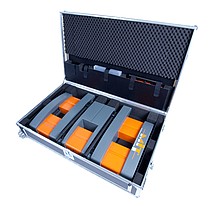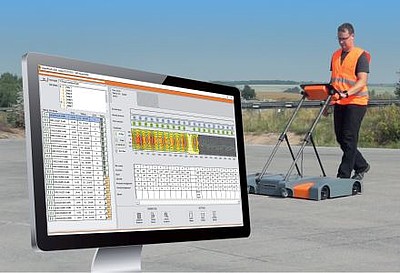The non-destructive electromagnetic determination of dowel and tie bar positions in concrete is using the puls induction measuring method, a further development of the eddy current method. It enables the operator to carry out precise, rapid and very effective measurements in the field.
Especially when compared to the likewise non-destructive electromagnetic method that uses refelction (GPR=ground penetrating radar), the pulse induction method implemented in the MIT-DOWEL-SCAN offers key advantages. Noteworthy are in particular its high measurement speed, simple and intuitive handling and enormous versatility. While GPR can´t be used on roads during wet weather, the MIT-DOWEL-SCAN delivers precise and reliable measurements even on roads that are rain-drenched. Measurement can even be taken on fresh concrete as soon as it can be walked on by the staff. In practice, the GPR system also relies on frequent core extractions, i.e. before starting the measurement or when deviations occur of the concrete´s properties on the measurement site. The dowel position measuring device MIT-DOWEL-SCAN, on the other hand, only requires an initial calibration of the type of dowel or tie bar used.
The MIT-DOWEL-SCAN also excels from the economical perspective: It enables users, for example, to determine the exact positions of dowel and tie bars on-site within a minute. GPR, by contrast, requires time-consuming evaluation at the office workplace.
The speed of the dowel position measurement device, therefore, not only enables large areas or road stretches to be inspected per workday, but also allows adjustments to be made during the paving process, e.g. changing the dowel inserter settings. Thes advantages together with the compact design, ease of use and versatility of the MIT-DOWEL-SCAN translate into substantially lower costs per test.
- Simple & intuitive operation
- Rapid & effective measuring
- Flexible use (even on wet surfaces and green concrete)
- Automatic evaluation of huge numbers of data
MIT-DOWEL-SCAN is recommanded due to its compact version and comfortable handling to all who are coping with quality control within the pavement industry.
NON-DESTRCUTIVE TESTING - ELIMINATE CORING - INCREASE QUALITY - DECREASE COSTS
















